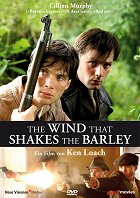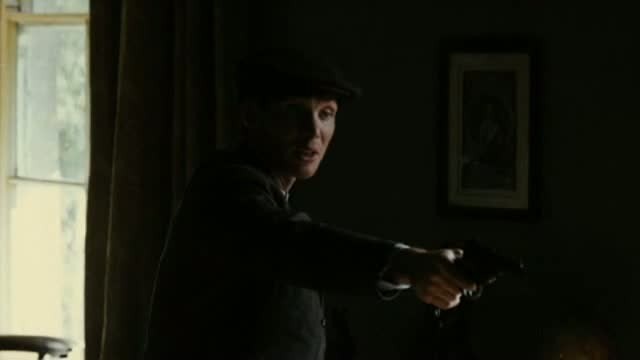Regie:
Ken LoachDrehbuch:
Paul LavertyKamera:
Barry AckroydMusik:
George FentonBesetzung:
Cillian Murphy, Liam Cunningham, William Ruane, Padraic Delaney, Mark Wakeling, Scott Peden, Roger Allam, Siobhan McSweeney, Frank O'Sullivan (mehr)Inhalte(1)
Zwei Brüder kämpfen Seite an Seite im irischen Unabhängigkeitskrieg gegen die britischen Unterdrücker, bis sich mit dem Waffenstillstand von 1921 das Blatt wendet. Jetzt stehen sie sich im Bürgerkrieg als Feinde gegenüber. Irland 1920: Irische Freiheitskämpfer rotten sich zusammen für ein letztes Aufbäumen gegen die Engländer – der Unabhängigkeitskrieg tobt seit dem Dubliner Osteraufstand 1916. Auf dem Weg nach London, wo er eine Stelle antreten soll, beobachtet der junge Arzt Damien, wie britische Soldaten einen Lokführer zusammenschlagen, als er sie nicht mitnehmen will. Da entschließt sich Damien, in Irland zu bleiben und für die Freiheit seines Landes in den Reihen der Irisch-Republikanischen Armee zu kämpfen – an der Seite seines Bruders Teddy, Anführer der Aufständischen. Gemeinsam entführen sie einen skrupellosen Großgrundbesitzer, erschießen britische Soldaten und eliminieren Verräter, selbst wenn diese alte Freunde waren. Ihre Taten rechtfertigen sie als Vergeltung für die Gräueltaten der Engländer, die mordend und Häuser niederbrennend durch das Land ziehen. Mit dem Waffenstillstand 1921 schließen Engländer und Iren im Dezember 1921 den Anglo-Irischen Vertrag, der den Irischen Freistaat begründet.
Nur 26 der 32 Grafschaften gehören dem Freistaat an. Ein Land spaltet sich, die zwei Brüder auch: Während Teddy die neue politische Wendung begrüßt und sich der Armee des neuen Freistaats anschließt, kämpft Damien weiterhin für ein unabhängiges Irland. Jetzt sind es die Iren, die Grausamkeiten gegen ihre eigenen Landsleute verüben, und Teddy und Damien, eben noch Waffenbrüder, stehen sich als Todfeinde gegenüber. Mit „The Wind that Shakes the Barley“ interpretiert Ken Loach den Bruderkampf zwischen England und Irland wörtlich durch den Kampf zweier Brüder. Das heldenhafte Pathos ist dabei neu im Werk von Ken Loach, auch die Zurschaustellung von Gewalt, von der sich der Regisseur nicht explizit distanziert. Seine Charaktere erkennen Gewalt als „notwendiges Mittel“. Es ist am Zuschauer, die Ziele und die Mittel zu ihrer Erreichung auszuloten.
(arte)
Videos (1)
Kritiken (2)
When there’s talk of Czech national pride, a lot of people say that it was there when the Germans occupied us. However, watch this movie to try and imagine how scarred the average Irish national pride is. What was happening there in the 1920s was no less harsh and I’m not all that surprised that this pride and separation from the Great Britain is so prominent to this day. It will probably never be any different for some families. It’s just a shame that the movie was so terribly emotionless. It was shot with such a strange camerawork that it even seemed like the camera was absent in some situations. It had good moments, for sure, but I feel like a premise like this could have had way more of them.
()
Whoever wants to see a big colorful and artistically ambitious film about the formation of the Irish Republic, the history of the struggle for independence, the events surrounding its creation, and the most famous moments in the history of the Irish Republican Army, should watch Neil Jordan's Michael Collins. The Wind That Shakes the Barley is a typically small production that looks like it's made for TV, and if the viewer wants to compare it with epic blockbusters, they will inevitably be disappointed. To be honest, I don't really understand its victory at prestigious film festivals because, from an artistic point of view, it is not possible to consider this film a festival peak. Its value lies in something else. I see it as a quality historically analytical film that provides today's viewer with relatively distant historical events. It is, in a way, an acted documentary filmed from the position of a protagonist who stands on left-radical positions in the historical dispute over the nature of the newly emerging Irish state. I have nothing against that, as many so-called historical films prefer an impressive story over a sober and factually presented historical truth. In the case of this film, it doesn't make sense to assess the film in terms of entertainment or artistic catharsis. However, it accurately describes the mechanism of the political crisis, guerrilla warfare for independence, and the subsequent conflict between radical supporters of violent solutions and those who are able to understand reality and negotiate compromises. For me, it deserves 3.5 stars, which I am elevating to four after a short consideration. Overall impression: 70%.
()



Werbung